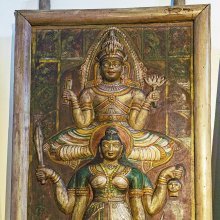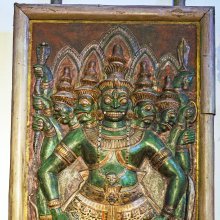Diva, Divā: 22 definitions
Introduction:
Diva means something in Hinduism, Sanskrit, Buddhism, Pali, the history of ancient India, Marathi, Jainism, Prakrit, Hindi. If you want to know the exact meaning, history, etymology or English translation of this term then check out the descriptions on this page. Add your comment or reference to a book if you want to contribute to this summary article.
Diva has 20 English definitions available.
Images (photo gallery)
Languages of India and abroad
Sanskrit dictionary
[Deutsch Wörterbuch]
Source: Cologne Digital Sanskrit Dictionaries: Böhtlingk and Roth Grosses Petersburger WörterbuchDiva (दिव):—n.
1) = 3. div a) oxyt. Himmel (Luftraum) [UJJVAL.] zu [Uṇādisūtra 1, 156.] [Trikāṇḍaśeṣa 1, 1, 4.] [Hemacandra’s Abhidhānacintāmaṇi 87,] [Scholiast] [Hemacandra’s Anekārthasaṃgraha 2, 525.] [Medinīkoṣa v. 11.] taiścaturbhirmaheṣvāsairgiriśṛṅgamaśobhata . lokapālairmahābhāgairdivaṃ devavarairiva .. [Mahābhārata 3, 11746. 14, 797.] [Harivaṃśa 5106.] divonmukha [Varāhamihira’s Bṛhajjātaka S. 27,c,10.] — b) Tag [Hemacandra’s Abhidhānacintāmaṇi 138.] — Häufig am Ende von compp. gaṇa śaradādi zu [Pāṇini’s acht Bücher 5, 4, 107.] [Vopadeva’s Grammatik 6, 62]; vgl. ahardiva, tri, naktaṃ, bṛhaddiva, rātriṃ, su . —
2) = vana Wald [Hemacandra’s Anekārthasaṃgraha]
--- OR ---
Divā (दिवा):—(instr. von div mit nicht vorgeschobenem Tone) ved., divā gaṇa svarādi zu [Pāṇini’s acht Bücher 1, 1, 37.] adv. am Tage [Amarakoṣa 3, 5, 6.] [Hemacandra’s Abhidhānacintāmaṇi 1531.] divā, naktam [Ṛgveda 1, 34, 2. 98, 2. 139, 5. 7, 15, 15. 140, 11 u.s.w.] [Atharvavedasaṃhitā 5, 7, 3. 29, 9.] sāyam, prātaḥ, rātryā, divā [11, 2, 16.] [The Śatapathabrāhmaṇa 2, 1, 4, 1. 11, 5, 1, 4. 14, 1, 2, 21.] [Praśnopaniṣad 1, 13.] [ĀŚV. GṚHY. 1, 2. 22.] [Manu’s Gesetzbuch 2, 102. 4, 50. 102. 106. 6, 19.] [Nalopākhyāna 2, 4.] [Sāvitryupākhyāna 5, 83.] [Rāmāyaṇa 4, 43, 45.] [Suśruta 1, 113, 16. 316, 5.] [Śākuntala 102.] [Kathāsaritsāgara 7, 32.] [Bhāgavatapurāṇa 1, 16, 10.] divārātram [Manu’s Gesetzbuch 5, 80.] [Mahābhārata 3, 12540. 16, 38.] [Rāmāyaṇa 1, 58, 12.] divāniśam [Manu’s Gesetzbuch 7, 44. 9, 2.] [Nalopākhyāna 13, 37. 20, 28.] [Raghuvaṃśa 19, 6.] adivā nicht bei Tage [Aitareyabrāhmaṇa 5, 31.] Das adv. als subj. an Stelle des nom. sg.: sarvamasmai divā bhavati [Pañcaviṃśabrāhmaṇa 5, 8, 9. 11, 1, 11.] sakṛddivā haivāsmai bhavati [Chāndogyopaniṣad 3, 11, 3.] kṣaṇā lavā muhūrtāśca divā rātristathaiva ca [Mahābhārata 2, 454.] tato nājñāyata tadā divārātraṃ tathā diśaḥ [3, 816.] [Bhāgavatapurāṇa 5, 22, 5.]
Source: Cologne Digital Sanskrit Dictionaries: Sanskrit-Wörterbuch in kürzerer FassungDiva (दिव):—n. —
1) der Himmel. —
2) Tag. Nur in der Verbindung divodive Tag für Tag , täglich.
--- OR ---
Divā (दिवा):—Adv. am Tage. Nicht selten als Subject (184 ,
25) oder am Anf. eines Comp. so v.a. Tag im Gegensatz zur Nacht.
Sanskrit, also spelled संस्कृतम् (saṃskṛtam), is an ancient language of India commonly seen as the grandmother of the Indo-European language family (even English!). Closely allied with Prakrit and Pali, Sanskrit is more exhaustive in both grammar and terms and has the most extensive collection of literature in the world, greatly surpassing its sister-languages Greek and Latin.
See also (Relevant definitions)
Starts with (+258): Divaa, Divabali, Divabhita, Divabhiti, Divabhoja, Divabhuta, Divacandantabatava, Divacara, Divacarin, Divachara, Divada, Divadarsha, Divaddha, Divadi, Divadivassa, Divadivita, Divaga, Divagana, Divagara, Divaha.
Ends with (+32): Adidiva, Adiva, Adyadiva, Ahardiva, Ahodiva, Akashadiva, Amshunattydivandiva, Apradiva, Atidiva, Brihaddiva, Curuti-kutiva, Cuti-kutiva, Dahadiva, Didiva, Divalica Diva, Dvidiva, Elgevadiva, Gandiva, Grindiva, Gudipadiva.
Full-text (+337): Ratrindiva, Divandha, Divakara, Divatana, Dia, Tridiva, Divarka, Divamani, Divabhiti, Sudiva, Divacara, Divasvapa, Divapushta, Divashaya, Div, Divasvapna, Divasprish, Divamgama, Divasupta, Divakrita.
Relevant text
Search found 84 books and stories containing Diva, Divā, Dīvā, Ḍiva, Dīva, Divaa; (plurals include: Divas, Divās, Dīvās, Ḍivas, Dīvas, Divaas). You can also click to the full overview containing English textual excerpts. Below are direct links for the most relevant articles:
Rig Veda (translation and commentary) (by H. H. Wilson)
Garga Samhita (English) (by Danavir Goswami)
Verse 5.1.5 < [Chapter 1 - Advice to Kaṃsa]
Verse 4.6.8 < [Chapter 6 - The Story of the Ayodhyā Women]
Verse 1.5.4 < [Chapter 5 - The Lord’s Appearance]
The Markandeya Purana (by Frederick Eden Pargiter)
Diaspora of Bhuta (Daiva) worshipping cult—India and Indonesia (by Shilpa V. Sonawane)
Part 10 - Diwata (Indonesia) < [Chapter 4 - Inter-Disciplinary Analysis]
Part 3.3 - Early History of Religion in Indonesia < [Chapter 4 - Inter-Disciplinary Analysis]
The Tattvasangraha [with commentary] (by Ganganatha Jha)
Verse 855-856 < [Chapter 15 - Examination of Samavāya (‘subsistence’)]
Verse 1592 < [Chapter 19c - (C) On presumption (arthāpatti)]
Verse 1620 < [Chapter 19c - (C) On presumption (arthāpatti)]
Chandogya Upanishad (Madhva commentary) (by Srisa Chandra Vasu)

